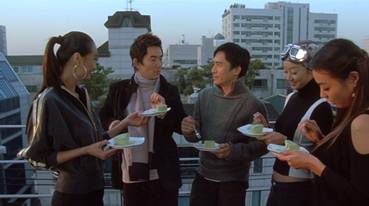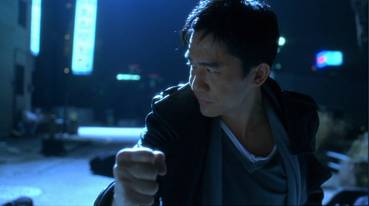|
You
should never, we are told, judge a book by its cover, but
brisk but cheesy opening titles of Jingle Ma's Seoul
Raiders – a kind of James Bond meets kiddie manga –
does give a fair flavour of what is to follow.
We're
plunged strait into the action, as such, as attractive and
ambitious female thief JJ (Shu Qi) stalks the corridors
of the high-tech headquarters of a powerful criminal gang and
past the bodies of unconscious security guards, only to
discover that well-dressed, freelancing secret agent Lam
(Tony Leung) has got there ahead of her. They've both come
for the same thing, a set of plates for forging US currency,
which are destined to be sold on to a powerful gangster known as Polar
Bear. A battle with a hoard of security guards follows
in which the case containing the plates repeatedly changes
hands, but although JJ finally escapes with the case, Lam has
pocketed its contents. Hoping to collect a sizeable reward,
he arranges an exchange with US agent Owen Lee (Richie Ren),
but Lee is not what he seems, and after drugging Lam, he grabs the plates
and heads off to Korea to sell them to Polar Bear. Lam,
with his three devoted fighting female assistants, gives
chase.

Not
a drop of this is even remotely believable as it plays
out on screen. This doesn't necessarily matter, as Hong Kong
comedy-actioners are rarely grounded in the rules of the
real world or that worried about the credibility of their
storylines. Which would all be well and fine, were it not
for a few things that just kept niggling at my enjoyment...
-
The
characters. To say they lack depth or, to a large
part, charisma, is an understatement. As with director
Ma's previous Silver
Hawk, they are little more than cartoons
and often played accordingly. Lam's all-female
troupe in particular function as a half-arsed Korean
Charlie's Angels, their ever-present grins and the anime-style biker's get-up of one of their number casting them
more as decoration than any sort of real force for
protection. Leung keeps things under the expected
level of control, which is a relief when paired
with Shu Qi's sometimes over-the-top cheeriness
as JJ (the sequence in which she flees in her boat
and laughs and slaps her hand on the case at her
perceived victory over Lam is a prime example),
but he still never makes Lam a three-dimensional character. The result is that it's hard to actually
care about any of them.
-
The comedy. To a large extent, it just isn't funny.
Of course it doesn't help that much of it is based around characters
that are not developed enough to invite either identification
or sympathy, let alone provoke a laugh. There are, on paper at least, a couple of sequences
that should have been a riot – a fists-up stand-off
between Lam and a Polar Bear's deputy that goes on
so long that the watching gang get bored and start
wandering off, and a punch-up between Owen and JJ
that prompts Lam to pull up a chair and open a packet
of crisps to watch – but both are effectively nobbled
by the execution.
-
The
fights. Now these are the raison d'être of martial arts actioners, but here are unspectacular
and shabbily staged to camera, lost in a blizzard
of edits and behind-object camera wandering. Sometimes they are also shot in near-silhouette to further detract
from the fighting skills of the participants.
-
The
underlying politics. A personal one here, but there
appears to be almost a subjugation of Chinese and
even Korean identity here in favour of loyalty to
America and fuck-you capitalism. Just about everyone,
good guys and bad (and we know the bad guys are bad
because they sneer and bully and are linked to anti-American
TERRORISM), appears to be driven by a thirst
for personal wealth. The film even ends (skip to
the next paragraph if you don't want to read this)
with Lam expressing his intention to go off and make
lots of dosh while he's still young.
-
The
music. Tackily generic at best and annoying at worse,
it reaches its nadir with a fight between Lam and
Owen in a spa pool and a really horrid ballad whose
subtitled lyrics (written by Ma) wonder: "What
on earth is going on here? What on Earth are they
doing to each other right now?" This is also
meant to be funny. Oh mercy.
All this
leaves the film with only its breezy pace and relentless
good cheer to lean on, and for this weary viewer it just wasn't
enough, especially less than a week after basking in the
comic-action delights of Wheels
on Meals, also released by Hong Kong Legends.
And when the action doesn't make the grade you are left
to dwell on the more absurd aspects of the plot, such as why,
in a huge criminal organisation with millions of dollars
at stake, a dangerous gang leader doesn't think of handing
out guns to his hired goons, or even carry one himself.
Framed
1.85:1 and anamorphically enhanced, the transfer is on the
whole rather good, but a few more dust spots are visible
than on the standard Hong Kong Legends release. Colours
appear to be sound, with the silvery-blue look of some
scenes a deliberate choice by director Ma and familiar to
anyone who has seen Silverhawk. Contrast
and sharpness are good, and black levels appear solid throughout.

The
original Cantonese soundtrack is available as a 5.1 or DTS
mix. Both are rather impressive, the principal differences
being ones of volume and wallop, with the DTS coming out
tops on both. Explosions and car collisions are appropriately
alarming, and the LFE kicks in nicely in the night club
scene. Surrounds are used well in places – a loud whistle
from the rears at the fashion show made me jump off the
sofa.
The
Promotional Gallery contains
the UK Promotional Trailer (1:17),
and the Original Theatrical Trailer
(1:34), which is in Cantonese with English subtitles. Both
are anamorphic widescreen. Promotional Art
(5:01) contains a collection of poster artwork and production
stills, which the camera drifts over and zooms in and out
on, accompanied by music from the film.
Seoul
Girls: A Travelogue might well be seen as
a rather frivolous inclusion, consisting of five mini-featurettes
(2:02 each) in which the Korean Charlie's Angels introduce
Shu Qi to various aspects of Korean life, namely spas, food,
Korean rice wine, shopping and plastic surgery. I have to
admit to rather enjoying this extra – the similarities between
Korean and Japanese social life (which I thoroughly enjoy
and always miss when back in the UK) are numerous, and it
brought back some fond memories. The fact that the girls
are all very pretty has nothing whatsoever to do with my
involvement in the piece. No sir.
The
Making of Seoul Raiders also has five mini-featurettes
(also 2:02 each) in very much the same style as the above.
The first three, focusing on actors Tony Leung, Richie Ren
and Shu Qi, are a mixture of behind-the-scenes footage and
mutual back-slapping. The final two are largely centred
around the filming of the final scene, involving a fight
around a light aircraft on a highway. You heard me.
Director's
Cut: An Interview with Jingle Ma (22:39) is
actually rather interesting, as the director covers the
background to the film's story, casting and working with
the three leads, working in Korea, filming on crowded streets,
his move from cinematography with direction, the colours
and look of the film, shooting the finale, the Korean film
industry, and how giggly the Korean actresses got when working
with Tony Leung, whom they all fancied.
Deleted
scenes (4:54) actually consists of only two,
and one of them lasts for 4 minutes, being a rather plodding
sequence in which JJ makes breakfast for Lam, who revives
an unfunny oversized comb gag from the opening scene. Slightly
more interesting, character wise, is a shorter scene in
which Lam and Owen discuss whether, if JJ were drowning,
they would save her or the plates first.
I
did try, I really did, especially given my fondness for
Hong Kong action cinema, but it's hard to get that excited
about anything in Seoul Raiders, a relentlessly
fluffy film experience that, like Silverhawk,
seems primarily targeted at a younger audience, or at least
one with little experience of old school Hong Kong action
comedies. It is well enough presented on this DVD, with
an OK selection of extras, but you'd do well to not be sucked
in by the presence of the great Tony Leung and check it
out before handing over your hard-earned cash.
|